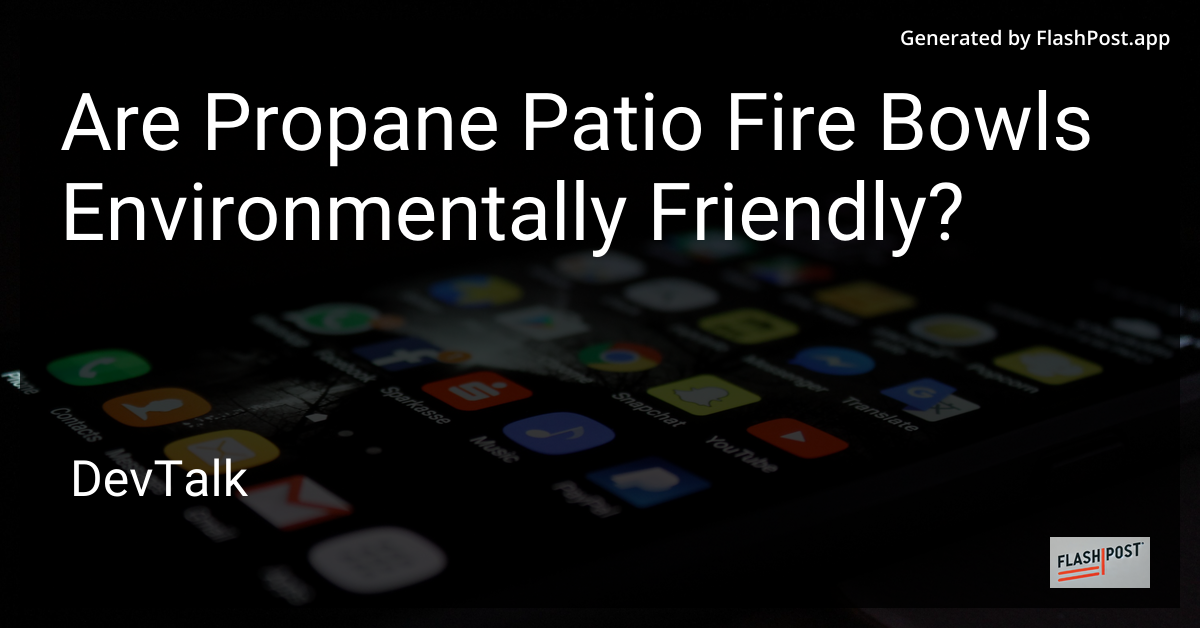Are Propane Patio Fire Bowls Environmentally Friendly?

Are Propane Patio Fire Bowls Environmentally Friendly?
With outdoor living spaces becoming increasingly popular, many homeowners are looking to enhance their patios with inviting features like fire bowls.
Propane patio fire bowls, in particular, have emerged as a popular option due to their convenience and aesthetic appeal. However, an important question often arises: are propane patio fire bowls environmentally friendly? In this article, we will delve into the environmental impact of propane fire bowls and consider if they align with sustainable living objectives.
Understanding Propane as a Fuel Source
Propane is a type of liquefied petroleum gas (LPG) that is often used as a fuel source for heating and cooking. It is stored under pressure as a colorless, odorless liquid that becomes gas upon release. Here's why it is favored:
- Efficiency and Clean Burn: Propane burns relatively clean compared to other fossil fuels. It emits fewer greenhouse gases such as carbon dioxide and carbon monoxide, reducing the overall carbon footprint.
- No Particulates: Unlike wood-burning options, propane combustion does not release soot or particulates into the air, leading to much cleaner air quality around your patio.
Comparing to Alternatives
-
Wood-Burning Fire Pits: While wood is a renewable resource, burning it releases significant amounts of smoke, particulates, and carbon dioxide. Propane fire bowls do not produce smoke, making them a less polluting alternative.
-
Natural Gas: Although similar in cleanliness to propane, natural gas installations can be more complex and less portable compared to readily accessible propane tanks.
Environmental Considerations
While propane itself burns cleaner than other fossil fuels, there are considerations to keep in mind:
- Extraction and Processing: The process of extracting and refining propane has environmental impacts, including habitat disruption and energy use.
- Non-Renewable Resource: Propane is a fossil fuel, which means it is non-renewable. As global reserves diminish, reliance on it may not be sustainable in the long term.
Making Eco-Friendly Choices
When choosing a propane patio fire bowl, consider the following eco-friendly practices:
- Efficient Models: Opt for fire bowls designed with efficient burners that maximize heat while minimizing fuel usage.
- Source Propane Responsibly: Choose propane from suppliers that prioritize sustainable extraction and processing methods.
- Complement with Sustainable Features: Enhance your outdoor space with environmentally friendly additions. Consider quick setup patio tents for shade, complying with patio furniture weight guidelines, or adding eco-friendly discount beverage carts for the patio.
Conclusion
While propane patio fire bowls offer a cleaner-burning alternative to traditional wood-burning pits, they still present certain environmental challenges due to their reliance on fossil fuels. Making informed decisions about your propane use and considering sustainable practices can help mitigate its environmental impact. When combined with other eco-friendly patio solutions, propane fire bowls can be part of a balanced approach to creating an environmentally conscious outdoor space.
Make sure to explore other sustainable patio living solutions to create a comfortable and eco-friendly environment right in your backyard.